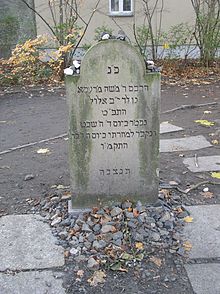Moses Mendelssohn
Born to a poor Jewish family in Dessau, Principality of Anhalt, and originally destined for a rabbinical career, Mendelssohn educated himself in German thought and literature.Moses' early education was provided by his father and by the local rabbi, David Fränkel, who, besides teaching him the Bible and Talmud, introduced to him the philosophy of Maimonides."[4] "Mendelssohn enrolled in Frankel's exacting seminary, where the program consisted of unending rote repetitions of early medieval texts, interpretations thereof, elaborations of Talmudic law, and copious commentary accumulated over the centuries.[8] In October 1763 the king granted Mendelssohn, but not his wife or children, the privilege of Protected Jew (Schutzjude), which assured his right to undisturbed residence in Berlin.Modelled on Plato's dialogue of the same name, Mendelssohn's work possessed some of the charm of its Greek exemplar and impressed the German world with its beauty and lucidity of style.In April 1763, Johann Kaspar Lavater, then a young theology-student from Zurich, made a trip to Berlin, where he visited the already famous Jewish philosopher with some companions.Lavater later described Mendelssohn in his book on physiognomy, Physiognomische Fragmente zur Beförderung der Menschenkenntnis und Menschenliebe (1775–1778), as "a companionable, brilliant soul, with piercing eyes, the body of an Aesop [who was traditionally considered ugly]—a man of keen insight, exquisite taste and wide erudition [...] frank and open-hearted"[14]—ending his public praise with the wish of Mendelssohn recognizing, "together with Plato and Moses... the crucified glory of Christ."In March 1771 Mendelssohn's health deteriorated so badly that Marcus Elieser Bloch, his doctor, decided his patient had to give up philosophy, at least temporarily.[15] After a short and restless sleep one evening, Mendelssohn found himself incapable of moving and had the feeling of something lashing his neck with fiery rods, his heart was palpitating and he was in an extreme anxiety, yet fully conscious.[16] In retrospect, his illness might be diagnosed as a heart-rhythm-problem (such as atrial fibrillation) and/or a mild form of familial dysautonomia, a hereditary disease of Ashkenazi Jews, which often brings with it a curvature of the spine and epilepsy-like symptoms in times of stress.[19] Although the cemetery was largely destroyed during the Nazi era, after German reunification, in 2007-2008, it was reestablished with monuments to its past, including a recreation of Mendelssohn's gravestone.Mendelssohn is also believed to be behind the foundation of the first modern public school for Jewish boys, "Freyschule für Knaben", in Berlin in 1778 by one of his most ardent pupils, David Friedländer, where both religious and worldly subjects were taught.He induced Christian Wilhelm von Dohm to publish in 1781 his work, On the Civil Amelioration of the Condition of the Jews, which played a significant part in the rise of tolerance.[14] Mendelssohn wrote: Brothers, if you care for true piety, let us not feign agreement, where diversity is evidently the plan and purpose of Providence.[14] In the view of the German writer Heinrich Heine, "as Luther had overthrown the Papacy, so Mendelssohn overthrew the Talmud; and he did so after the same fashion, namely, by rejecting tradition, by declaring the Bible to be the source of religion, and by translating the most important part of it.Mendelssohn then published his Morgenstunden oder Vorlesungen über das Dasein Gottes (Morning hours or lectures about God's existence), seemingly a series of lectures to his oldest son, his son-in-law and a young friend, usually held "in the morning hours", in which he explained his personal philosophical world-view, his own understanding of Spinoza and Lessing's "purified" (geläutert) pantheism.Recha's only grandson (son of Heinrich Beer, brother of the composer Giacomo Meyerbeer), was born and educated as a Jew, but died very young, together with his parents, apparently from an epidemic.




Anton GraffDessauAnhalt-DessauBerlinKingdom of PrussiaJosephAbrahamBrendel18th-century philosophyMetaphysicsPhilosophy of religionGerman-JewishphilosophertheologianHaskalahPrincipality of AnhaltrabbinicalGermantextile industryFelix MendelssohnPaul Mendelssohn BartholdyKurt HenselMendelssohn & Co.Abraham MendelssohnscribeDavid FränkelTalmudMaimonidesIsrael ZamoszphysicianGraetzJohn LockeAn Essay Concerning Human UnderstandingAaron Solomon GumperzGotthold Ephraim LessingNathan the WiseFrederick the GreatGottfried LeibnizDanzigGdańskFriedrich NicolaiBerlin AcademyThomas AbbtImmanuel KantProtected JewSchutzjudeMaterialisticPhädon oder über die Unsterblichkeit der Seelesame nameEnglishMoritz Daniel OppenheimMagnes Collection of Jewish Art and LifecriticismJudaismJohann Kaspar LavaterCharles BonnetConfuciusphysiognomyMarcus Elieser BlochJohann Georg Ritter von Zimmermannatrial fibrillationfamilial dysautonomiaepilepsyChina barkleechesenemaslemonadeHebrewShevatGerman reunificationJewish Museum, BerlinJewish Museum of SwitzerlandPentateuchExodusYiddishmidrashimDavid FriedländerChristian Wilhelm von DohmMenasseh Ben IsraelJerusalemNew TestamentZachariasmonarchyrepublicdogmasHeinrich HeineLuthercatholicismpantheism controversyLessingFriedrich Heinrich JacobiSpinozistatheistJohann Gottfried von HerderJohann Georg HamannMendelssohn familysix childrenMendelssohn banking houseAlexander von HumboldtSimon VeitPhilipp VeitFriedrich von SchlegelGiacomo MeyerbeerBiuristsFridolin FriedmannSara GrotthuisHeinrich JosefsohnThe Jewish questionHebrew calendarThe Cambridge Companion to MendelssohnElon, Amos1 Samuelpublic domainAbrahams, IsraelChisholm, HughEncyclopædia BritannicaAltmann, AlexanderBrand, AronMomigliano, ArnaldoInternet ArchiveIn Our Time (BBC Radio 4)Christopher ClarkUniversity of CambridgeUniversity of OxfordKing's College LondonMelvyn Bragg